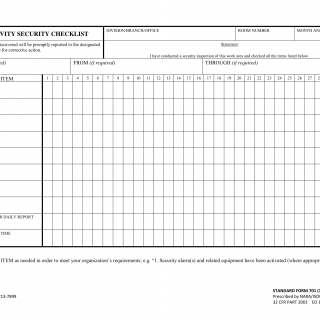SF 701. Activity Security Checklist
SF 701 is an official form used in the United States by government employees and contractors to document the security measures taken during an activity. The purpose of this form is to ensure that all necessary security steps have been taken before, during, and after an event or activity to protect classified information and maintain national security.
The form consists of several parts, including the name of the activity, the date and time of the activity, the location, the names of everyone involved, and a detailed checklist of security measures taken before, during, and after the activity. The most important fields on the form are the ones related to security measures, such as securing entrances, validating identification, and restricting access to sensitive information.
The parties involved in compiling this form are typically government employees or contractors who are responsible for the security of sensitive information, such as classified documents or data. It is important to consider certain features when compiling this form, including the potential risks associated with the activity, the security clearance of those involved, and any potential breaches in security that may occur.
When compiling the form, the data required usually includes details on the activity, as well as specific security measures taken. Additionally, relevant documents, such as security clearance records, may need to be attached.
This form is beneficial because it helps ensure that all necessary security measures have been taken to protect sensitive information and prevent any security breaches from occurring. However, there may be challenges and risks associated with filling out this form incorrectly or failing to take appropriate security measures during an activity.
There are no related or alternative forms to SF 701, as it is unique to government security protocols. The form affects the future of the participants by ensuring that they are taking appropriate measures to protect sensitive information and maintain national security.
Completed forms are typically stored within government systems and kept confidential to protect the sensitive information contained within them.

